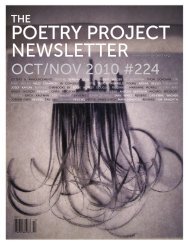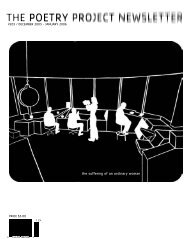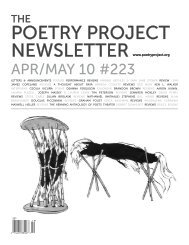Download PDF - The Poetry Project
Download PDF - The Poetry Project
Download PDF - The Poetry Project
You also want an ePaper? Increase the reach of your titles
YUMPU automatically turns print PDFs into web optimized ePapers that Google loves.
THE POETRY PROJECT NEWSLETTER<br />
29<br />
BOOK REVIEWS<br />
in his reappropriation of the Iliad. In Hawkey’s<br />
appropriation of “Nachtlied,” “Erstaart vor<br />
Bläue, ihrer Heiligkeit” becomes “For the blue<br />
of error-stars, heaven’s klieg light,” loosely but<br />
effectively evoking the efflorescence of the original.<br />
Later in the same poem, “nächtlichen” becomes<br />
“night-lichen” and “Spiegel der Wahrheit<br />
[mirror of truth]” becomes “speech’s warfare.”<br />
It is some work to track down the originals, as<br />
Hawkey does not always give clear pointers to<br />
his sources, but a good many of his treatments<br />
become more evocative when viewed with the<br />
originals at hand. As I participated by delving<br />
through Trakl, I came to identify further with<br />
Hawkey’s position.<br />
Other words and phrases recur throughout the<br />
poems, again pointing to a hidden web of connections<br />
behind the veil of a different language.<br />
“Reasons Why Orphans Wear Stillness-Mittens”<br />
picks up on that final word, already used in earlier<br />
poems in the book, and gives an ordered list of<br />
those reasons. It is strongly affecting, drawing<br />
on Hawkey’s ability to take these strange homophones<br />
and draw out their emotional juice. It<br />
is here he perhaps comes closest to achieving<br />
something of Trakl’s own foreboding presence,<br />
by way of creating distance from both Trakl and<br />
himself through the space between languages.<br />
<strong>The</strong> recurrent use of such words across poems<br />
reinforces the effect. A number of poems use<br />
the word “sternum,” linking the heart and chest<br />
to the stars (the German stern), a link that is a<br />
fitting metaphor for the book itself.<br />
<strong>The</strong>re is an inherent element of risk, however.<br />
In Hawkey’s idiolect, “Durch Wolken fährt ein<br />
goldner Karren” becomes “A duck fart woke<br />
the golden Karen,” in a coarse excursion into<br />
sub-Silliman space that even apologizes for<br />
itself: “how completely your mirror-language /<br />
Has failed.” It seems we must take the good<br />
with the bad, but it sits uneasily next to the talk<br />
of war and insanity elsewhere in the pages.<br />
<strong>The</strong> prose excursions are more tentative, lacking<br />
the focused incandescence of the best poems<br />
in the book. <strong>The</strong> “interviews” with Trakl, in<br />
particular, strive for a self-consciously awkward<br />
engagement, but sometimes slide into a stilted<br />
preciousness. Yet there are still such gems as<br />
Hawkey’s thoughts on gazing at Trakl’s manically<br />
intense expression: “Your physician in the Krakow<br />
asylum reported that you often saw a man with<br />
a drawn knife standing behind your back. Even<br />
though your head faces forward, your gaze<br />
seems directed there, behind you.”<br />
Taken as a whole, these problematic points<br />
still contribute to the book’s acutely Midrashian<br />
quality. Appropriation becomes a motif, with<br />
Hawkey noting his lifts from Spicer, David Cameron,<br />
the Zukofskys, and others. Nothing prevented<br />
him from adopting more novel techniques, as<br />
K. Silem Mohammad has done, for example,<br />
in his treatments of Shakespeare. But Hawkey<br />
chooses to emphasize Ventrakl’s lack of autonomy.<br />
<strong>The</strong> translations/deformations are littered<br />
with contemporary references both serious<br />
and trivial. <strong>The</strong> strangely po-faced introduction<br />
drops Bachelard, Heidegger, Agamben, Stein,<br />
and Benjamin in its first three pages, encasing<br />
the book in a theoretical carapace that stresses<br />
its dependency on contemporary poetic discourse.<br />
Trakl, in contrast, comes to seem increasingly<br />
universal in refusing to provide anything<br />
but the barest specifiers of time and place.<br />
Weighed down by its declared lack of autonomy,<br />
the book appeals to Trakl as a source of unimpeachable<br />
authenticity, only to be overwhelmed
















